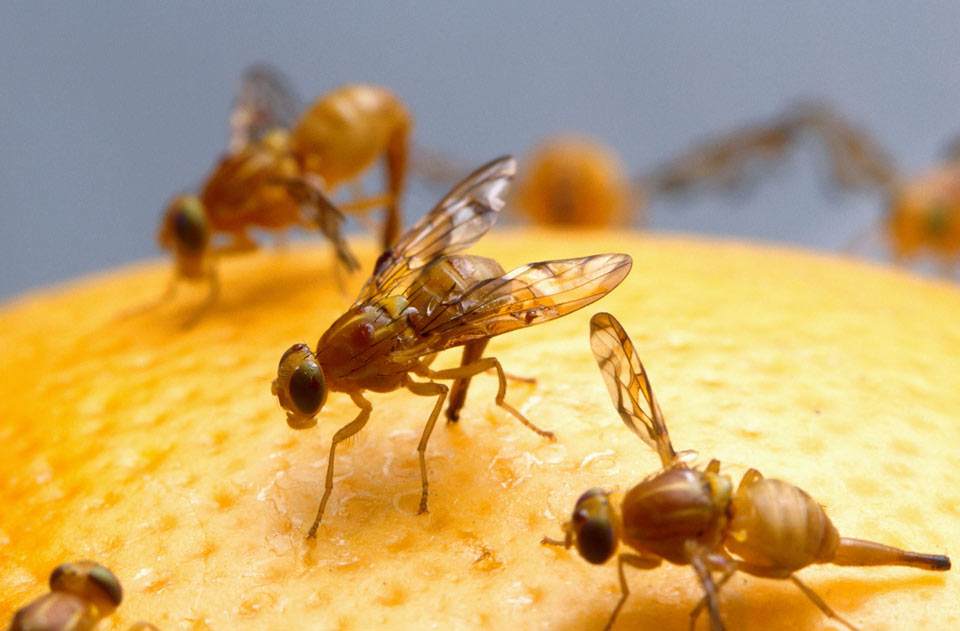(单词翻译:单击)
听力文本
This is Scientific American — 60-Second Science. I'm Christopher Intagliata.
Just like humans, fruit flies have to eat a balanced diet.
"They need sugar to survive, they need amino acids to make eggs, to have stem cells proliferate. They need salt, they need vitamins."
Carlos Ribeiro, a neuroscientist at the Champalimaud Center in Portugal. Yeast, he says, is a crucial component of the fly diet. "I always say, yeast is the steak of the fly."
Take yeast away, and the flies crave it—gotta make those eggs. Ribeiro and his team found they could also elicit that yearning for yeast simply by removing a few key amino acids from the flies' diet—but only in those flies that had their gut microbiome wiped out.
Here's the twist: when Ribeiro and his colleagues restored the standard fly gut microbiome, amino-acid-deprived flies did not seek out yeast to compensate. That might seem like the gut microbes are actually working against the flies' best interest—blocking their instincts to seek out missing nutrients.

But what actually happened, Ribeiro says, is that flies with the gut microbes maintained good egg production despite their nutritional deficiency. Suggesting that somehow, microbes help the flies adapt to nutrient-poor conditions.
"So somehow the microbes reprogram the metabolism of the fly to now cope better with an absence of amino acids in the diet. And that might also lead then to the fly not having to produce a strong craving for amino acids." The study is in the journal PLoS Biology.
Of course, flies are not humans. But still, Ribeiro says, "I think there is now more and more compelling evidence that the microbes in the gut, also of humans, affect behavior, mood and stress, and maybe even, people propose, some diseases. But how microbes do so and why they would do so is completely unclear."
Still: next time you're staring at a menu, undecided on what to order...you might try just going with your gut.
Thanks for listening for Scientific American — 60-Second Science Science. I'm Christopher Intagliata.
参考译文
这里是科学美国人——60秒科学。我是克里斯托弗·因塔利亚塔。
和人类一样,果蝇也要饮食均衡。
“它们需要糖分来维持生存,需要氨基酸来产卵和增殖干细胞。它们也需要盐分和维生素。”
卡洛斯· 里贝罗是葡萄牙尚帕利莫中心中心的神经科学家。他表示,酵母是果蝇饮食中的重要组成部分。“我总是说,酵母就相当于果蝇的牛排。”
如果去掉酵母,那果蝇就会四处寻找它,因为果蝇需要酵母来产卵。里贝罗和他的团队发现,只需要去掉果蝇饮食中的几种关键氨基酸,就可以激发苍蝇的这种渴望——但这只对肠道微生物群遭到破坏的果蝇有效果。
但是令人纠结的事情出现了:当里贝罗和同事恢复了果蝇体内的肠道微生物标准后,被去除氨基酸的果蝇并没有来寻找酵母来进行补偿。可能是肠道微生物会对抗果蝇的最佳利益,即阻止果蝇寻找所缺失营养的本能。
但是里贝罗表示,事实是,尽管营养缺乏,果蝇肠道微生物仍然维持了高质量的产卵水平。这表明,微生物以某种方式帮助果蝇适应了营养匮乏的环境。
“所以,微生物以某种方式重新调节了果蝇的新陈代谢,使其更好地适应缺乏氨基酸的饮食。这可能也导致果蝇不会对氨基酸产生强烈的渴望。”这项研究成果发表在《公共科学图书馆·生物学》期刊上。
当然,果蝇与人类不同。不过里贝罗表示,“我认为有越来越多的强有力证据表明,肠道微生物会影响行为、情绪和压力,甚至可以会引发一些疾病,对动物如此,对人类也一样。但至于微生物如何以及为何这样做,我们则完全不清楚。”
不过:你在餐厅盯着菜单不知道点什么吃的时候,可以让肠道来决定。
谢谢大家收听科学美国人——60秒科学。我是克里斯托弗·因塔利亚塔。
译文为可可英语翻译,未经授权请勿转载!
重点讲解
重点讲解:
1. take away 拿走;夺走;
例句:Don't let him take away your freedom to think for yourself.
别让他夺去你独立思考的自由。
2. wipe out 摧毁;毁灭;使灭绝;
例句:The attack is to wipe out data, to delete flies, or to format the hard disk.
常见的攻击方式是消除数据、删除文件或者格式化硬盘。
3. seek out 寻找到;找出;
例句:Now is the time for local companies to seek out business opportunities in Europe.
对于当地公司来说,现在是时候去欧洲寻求商机了。
4. adapt to 适应;
例句:Chung has tried to adapt to local customs.
钟努力去适应当地的风俗习惯。
5. stare at 凝视;盯着看;
例句:Don't stare at me— it's impolite!
别盯着我看——这是不礼貌的!


